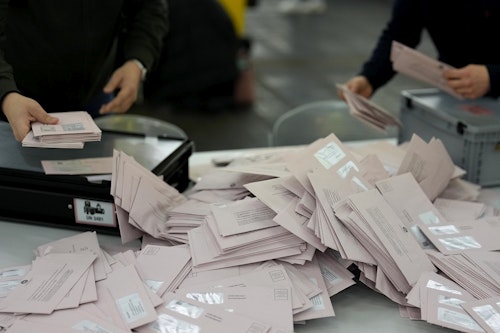Revisit Euronews' Sunday blog as Germany voted to elect its new chancellor and parliament.
German citizens went to the polls this Sunday, taking part in snap federal elections in a vote that will shape the course of the EU's largest member state and its biggest economy for the next four years.
After the first exit polls, the centre-right CDU’s Friedrich Merz has come out of the election as its main winner and is now likely set to become chancellor, replacing Olaf Scholz from the centre-left SPD, who admitted defeat on Sunday evening.
The incoming government will inherit an economy that has shrunk for two consecutive years for the first time in decades, rising living costs, and calls for a radical overhaul of its immigration and asylum rules.
Euronews' TV show was live from 5:30 pm CET, featuring a number of notable guests and our correspondents and analysts discussing the political meaning of the results, the next steps for Germany, and the vote's impact on Europe.
Revisit Sunday's updates in our live blog below, and rewatch our live coverage in the player above.

 ${title}
${title}
Live ended
Sunday night wrap: Coalition talks loom as CDU leads, Lindner to leave politics after FDP falls short
All eyes were on Germany this Sunday, as tens of millions voted in key federal elections that many believe will shape the future of the country and Europe alike.
The exit polls are being updated, and coalition talks are set to begin shortly. Last night’s election saw the centre-right CDU lead, followed by the far-right AfD, the centre-left SPD, and the Greens.
CDU chancellor candidate Friedrich Merz announced plans to form a government by Easter. Markus Söder, head of the CDU’s sister party CSU, has confirmed that a potential coalition with the Greens is still on the table despite previously ruling it out during the campaign.
Chancellor and centre-left SPD's candidate Olaf Scholz has stated that he will not lead any future coalition talks with the CDU, as he "applied to be chancellor".
FDP leader Christian Lindner, after his party failed to cross the 5% threshold, has announced he will leave politics.
Thank you for following our live blog. Stay tuned to Euronews in the coming days for the latest updates on the election and potential coalition talks.
Post-election debate: Merz rules out coalition with AfD, focuses on strengthening Europe
German public broadcaster ARD's "Berliner Runde" post-vote debate gathered all main candidates on Sunday night for a set of main takeaways.
Centre-right CDU leader Friedrich Merz, the election's main winner, was understandably at the centre of the discussions.
Merz, who is increasingly likely Germany's next chancellor, reaffirmed his stance against forming a coalition with the far-right AfD, emphasising that their politics do not align with those of the Union's parties.
On foreign policy, Merz stressed that: "the absolute priority is for Europeans to communicate and be united." He confirmed his ongoing close contact with many heads of state and government within his party, stating that the goal is to strengthen Europe to achieve independence from the US.
Merz also criticised parts of the American government, asserting that "we should have no illusions about what comes from America. Elon Musk's intervention in the election campaign is as dramatic and outrageous as Moscow's intervention."
Meanwhile, centre-left SPD's Olaf Scholz suggested that he might not initiate coalition talks with the CDU as he aims to become chancellor again — which, given his party's underwhelming showing, seems nearly impossible.
Also, Christian Lindner from the liberal FDP stated that if the FDP fails to clear the 5% threshold, he would consider leaving politics. Currently, the FDP stands at 4.7%. Not all votes have been counted yet.
Euroviews: Germany's economy should once again shine
Germany’s economy faces significant challenges, including an ageing workforce, underinvestment, and regulatory inertia, which threaten stagnation, the World Economic Forum's Alex Roth writes for Euroviews.
According to him, the country’s economic strength has been built on a robust industrial base, skilled labour, and strong institutions, but global shifts — such as the loss of cheap Russian energy, US security support, and reliance on China — have exposed deep vulnerabilities.
"Reforms are urgently needed, particularly in fiscal policy, to allow for more public investment in infrastructure, digitalisation, and decarbonisation. Labour shortages, caused by demographic changes, also demand action, including attracting 1.5 million migrants by 2029. Further integration of women into the workforce and simplifying regulatory processes could help address these issues," Roth wrote.
It’s time to rev up Germany’s economic engine
Without decisive action, Germany risks stagnation. But with the right reforms, the country can repair and rev up its stuttering economic engine, Alex Roth writ…
Trump and Netanyahu congratulate Merz
The first congratulatory messages from world leaders are arriving. US President Donald Trump posted on his social network Truth Social that "it looks like the conservative party in Germany has won the highly anticipated and significant election."
"Much like in the US, the people of Germany grew tired of the lack of common sense in the agenda, particularly on issues like energy and immigration, that has dominated for so many years," he said.
"This is a great day for Germany and for the United States of America under the leadership of a gentleman named Donald J Trump. Congratulations to all — many more victories to come," Trump concluded.
Israel’s Prime Minister Benjamin Netanyahu also congratulated Friedrich Merz and the CDU, stating in a post on X that he is "looking forward to working closely with your upcoming government to further strengthen the partnership between our two countries."
Previously, Merz has stressed the need for stricter measures to combat antisemitism, protect Jewish communities, and ensure Israel’s security.
Congratulations to @_FriedrichMerz and @CDU/@CSU on their clear election victory today. Looking forward to working closely with your upcoming government to further strengthen the partnership between our two countries.
— Benjamin Netanyahu - בנימין נתניהו (@netanyahu) February 23, 2025
Greens: 'Disappointed, but not surprised'
The Greens have been shaken by several significant setbacks tonight. On the one hand, they have not outperformed polls that saw them losing ground — instead, they will have to settle for a result of under 13%, according to Euronews' Mathias Huber.
Senior Greens figures are particularly disappointed in far-left Die Linke or The Left party outperforming them among under-25s. One senior party figure admitted the Greens were not able to capitalise on voters' disappointment with centre-right CDU leader Friedrich Merz's controversial immigration vote.
SPD's Sunday fete over?
Members of the SPD have started to leave early after they learned of their historically low projected result of 16%, Euronews correspondent Tamsin Paternoster reports.
One party member said he was sad, calling the defeat "massive".
According to him, a coalition with the CDU would still be possible, but trust in Merz was at an "all-time low".
Scholz himself called the result "bitter" and said it was his responsibility. He congratulated the CDU's Friedrich Merz and called on all parties not to work with the far right.
Greens' Habeck doesn't rule out coalition with CDU and SPD
The Greens' chancellor candidate, Robert Habeck, said on Sunday evening his party was ready for a "Kenya coalition" with the CDU and SPD. However, he noted that the decision to involve the Greens in the coalition rests with CDU leader Friedrich Merz.
Just on Saturday, Merz ruled out a coalition with the Greens. "The left is over," he said in Munich at the end of his party's election campaign. "There is no more left-wing majority and no more left-wing politics in Germany."
Merz hasn't ruled out any coalitions tonight, as talks are expected to start immediately.
Merz’s centre-right CDU lead in Germany’s federal election, exit polls show
Chancellor Olaf Scholz has conceded defeat for his centre-left SPD, following a "bitter election result" in Sunday's federal elections.
The exit polls show opposition leader Friedrich Merz and his centre-right CDU party in the lead, with Merz set to become Germany's next chancellor. The CDU is expected to secure about 28.8% of the vote, making it the largest party in the Bundestag.
Meanwhile, the AfD party is on track for the far-right's best result since World War II, with co-leader Alice Weidel claiming her party has become Germany's second-largest political force and is open to coalition talks with Merz's CDU. The SPD, under Scholz, is projected to finish in third place with a disappointing 16.2%, marking their worst postwar election result.
Scholz has acknowledged his loss and the end of his tenure as chancellor, a role he has held since December 2021. The election is seen as crucial for the future direction of Europe's largest economy and the EU's biggest member state.
Exit polls: Merz’s centre-right CDU lead in Germany’s federal election
Incumbent Chancellor Olaf Scholz has conceded defeat for his centre-left Social Democrats (SPD) after what he called “a bitter election result” on Sunday. #Eur…
Merz thanks voters 'for trust placed in us and me'
CDU chancellor candidate Friedrich Merz has declared his party's victory on X once again, thanking the voters for their support.
"We - the CDU and the CSU - have won this Bundestag election. Thank you for the trust you have placed in us and in me," Merz said on Sunday evening.
"And in this context, I would like to say a word of respect for our political competitors. We will now quickly fulfil our government mandate, because the world out there is not waiting for us. Nor is it waiting for long coalition talks and negotiations. We must now quickly regain our ability to act," the post on the social network said.
„Wir - die @CDU und die @CSU - haben diese Bundestagswahl gewonnen. Danke für das Vertrauen, das Sie uns und das Sie mir gegeben haben. Und ich möchte in diesem Zusammenhang ein Wort des Respekts für unsere politischen Wettbewerber sagen. Wir werden unserem Regierungsauftrag nun… pic.twitter.com/sFuB8C2qMr
— Friedrich Merz (@_FriedrichMerz) February 23, 2025
Costa announced unscheduled meeting just after polls closed in Germany
European Council President António Costa announced an unscheduled meeting for early March, right after the polls closed in Germany on Sunday. In his message on X, Costa emphasised that Europe and Ukraine were at a critical moment for their security.
While he didn't comment on the election results, he highlighted that he would work with Commission President Ursula von der Leyen and all member states to be ready for decision-making on 6 March — a clear indication of the urgency for a functioning German government.
I have decided to convene a special European Council on 6 March.
— António Costa (@eucopresident) February 23, 2025
We are living a defining moment for Ukraine and European security.
In my consultations with European leaders, I’ve heard a shared commitment to meet those challenges at EU level: strengthening European Defence…
Who are the winners and losers among the smaller parties?
In addition to the traditional parties and the far-right AfD, which all polled above 10%, the smaller parties are also playing a significant role in tonight's election results. One of the notable winners is the far-left Die Linke or The Left party, which has reached 8.5%, according to the latest ARD polls.
The future of the liberal FDP party and the left-wing conservative BSW in the Bundestag remains uncertain. Both parties are currently polling just below the 5% threshold required to enter parliament.
The Left's recent surge in popularity can be attributed to a blend of old-school political campaigning and a strong social media presence. Despite facing challenges, figures like Gregor Gysi, Dietmar Bartsch and Bodo Ramelow, in a campaign nicknamed "Mission Silberlocke," have leveraged social media platforms like TikTok and Instagram to reach younger, digitally engaged voters.
The party's social media presence has been instrumental in revitalising its appeal, garnering millions of views on platforms like TikTok, YouTube and X.
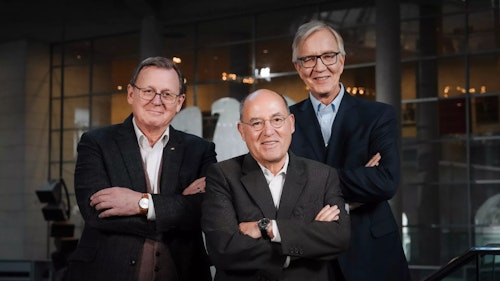
The success of the "Silberlocke" campaign, however, isn't solely about viral moments. Communication experts highlight the authenticity of speeches and social media interactions, which have resonated with younger generations. For example, Heidi Reichinnek's impassioned speech in the Bundestag went viral, generating millions of views. The Left's more personable approach contrasts with the populist style used by other parties, like the far-right AfD, which usually relies on shock value and extreme rhetoric to attract attention.
Merz says he's tonight's winner, Scholz admits defeat
At the centre-right CDU's Konrad-Adenauer-Haus election HQ, chancellor candidate Friedrich Merz acknowledged his party's lead.
"We, the Union – the CDU and CSU – we have won this federal election," Merz said, adding that he's "aware of the responsibility that now lies ahead of me."
Merz emphasised that it was now the party's responsibility to form a new government swiftly. "The world out there is not waiting for us," he stated.
Olaf Scholz's centre-left SPD was one of tonight's main losers. He described the results as "bitter" and acknowledged his defeat. "The polls didn’t improve, but we fought until the end," Scholz said, taking responsibility for the election outcome.
SPD Secretary General Matthias Miersch also called it a "bitter evening" for the party, admitting that "this is a historic defeat for the SPD."
Voter turnout at 83% — a significant bump compared to 2021
According to data published by Germany's public broadcaster ZDF, voter turnout for this election stands at 83%, a notable increase from the 76.6% turnout in the 2021 federal election.
Nearly 60 million Germans were eligible to vote. However, according to surveys, about 30% were still undecided about who to cast their ballot for this Sunday.
Is Germany heading for another three-party-coalition?
If the liberal FDP and the left-wing conservative BSW secure enough votes to enter the Bundestag, a three-party coalition might be the only viable option.
According to ZDF projections, only two alliances would have a majority, requiring at least 316 seats, aptly named after the colours representing the different parties: the "Germany" coalition (CDU/CSU, SPD and FDP) with potential 328 seats and the "Kenya" coalition (CDU/CSU, SPD and Greens) with a suggested total of 374 seats.
A "Midnight" coalition between the CDU/CSU and the far-right AfD would reach a slim majority with 318 seats, but CDU chancellor candidate Friedrich Merz has ruled out any alliance with the AfD.
It looks like this time certain groupings, like the “Jamaica” coalition (CDU-Greens-FDP), “Kiwi” (CDU-Greens) or “Papaya” would not suffice.
Early projections indicate a significant political shift, with Germany's ruling coalition suffering a heavy blow.
The SPD, Greens and FDP have secured just 33.5% of the vote — a steep drop from their combined 52% in 2021. Chancellor Olaf Scholz’s so-called "traffic light" coalition must now face a significant electoral defeat, according to first exit polls.
Centre-right CDU leads with around 29% of the vote, first exit poll suggests
As voting ended across Germany, the first exit polls have been released. The centre-right CDU leads with 28.5%, according to the latest ZDF poll, followed by the far-right AfD at 20%.
Olaf Scholz’s centre-left SPD comes third with 16.5%, while the Greens stand at 12% — their highest result to date. In 2021, they secured just 6.5% to 10.8%.
Migration takes centre stage in election campaign
Migration was at the heart of Germany’s election campaign, with the main parties presenting different approaches to border control and immigration.
The centre-right CDU promises a "fundamental shift" in migration policy, advocating stricter border controls and immediate deportations.
Meanwhile, the far-right AfD calls for a restrictive system based on Germany's economic and cultural interests, proposing to replace the right to asylum with an "institutional guarantee" and amend the Geneva Refugee Convention.
The SPD and Greens focus on a "humanitarian" approach, with the Greens distinguishing between asylum and labour migration. The SPD supports the EU’s new Common European Asylum System (GEAS), set to take effect in 2026.
Beyond manifestos, CDU leader Friedrich Merz has outlined a so-called "Sofortplan" ("emergency plan") to curb illegal migration, while Green candidate Robert Habeck backs the swift implementation of GEAS but supports deporting dangerous offenders.
Psychologist Ahmad Mansour criticised the parties' election campaigns and their sole focus on migration rather than integration. While all parties discuss border control, he told Euronews that millions of migrants already in Germany need long-term solutions, urging politicians to continue addressing the issue beyond the election.
Will The Left party spoil the Greens' election success?
The mood at the election night event in Berlin-Kreuzberg organised by the Greens seems relaxed.
Upon listening closer, whispers of discussions about the far-left Die Linke or The Left party and the far-right AfD can be heard, writes Euronews Journalist Mathias Huber.
There seems to be a lot of anticipation in the air — both for the result of their own party and the other contenders.
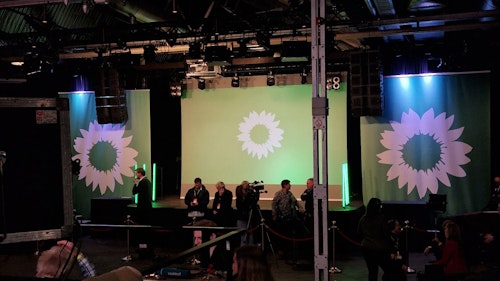
Polls are predicting a result of between 12 and 14% — a decline from the Greens' best-ever performance of 14,8% in 2021. Visitors and party faithful will be hoping that the loss is as minor as possible tonight. But there is one party that might spoil their night - The Left.
While the Greens have been on a slight downward trajectory in recent weeks, their leftist rivals have experienced a massive surge in support off the back of their viral campaign videos on TikTok, which have accumulated millions of views and even eclipsed the AfD's total number of likes on the platform.
Unsurprisingly, the Greens have intensified their criticism of The Left party in the campaign's last days. They have mainly focused on portraying themselves as the responsible alternative, as they have, in contrast to The Left, strongly articulated a desire to be included in the next government, even if that means making compromises.
The Greens candidate Robert Habeck in particular has said that ruling out a coalition among democratic parties is counterproductive. "That would only strengthen the far right", he said.
Whether they reach their objective of being a major player in German politics for the years to come is up in the air - it depends not only on them but also on the performance of smaller parties, like the liberal FDP. The tense wait is likely to continue later into the night.
Polls remain open for another hour
Good evening, Johanna Urbancik here from Euronews' Berlin office, taking over the blog.
Polls remain open for another hour until 6 pm, when the first exit polls will also be released.
Tune in to our special live coverage from 5:30 pm. This evening's guests include Euronews Editorial Director Claus Strunz, former European Council President Charles Michel, former Greek Prime Minister George Papandreou, former Greek Finance Minister and MeRA25 Secretary General Yanis Varoufakis, former European Parliament Vice-President Silvana Koch-Mehrin, and German climate activist Luisa Neubauer.
Our correspondents are reporting live from the CDU, SPD, AfD and Green headquarters in Berlin.
Stay with us for the latest on the 2025 German federal election.
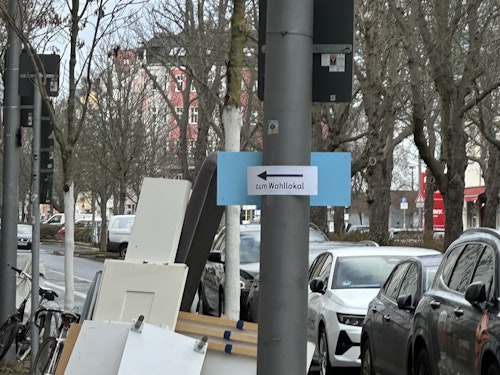
Bayern Munich's Uli Hoeness speaks out against far right
Former Bayern Munich player Uli Hoeness says he would speak with any of the club’s players who support the far-right AfD party “and ask him if he still has all his tools in his toolbox.”
Hoeness, Bayern’s honorary president after more than 40 years at the forefront of the club, made the remarks in an interview with Kicker magazine.
Hoeness previously spoke against AfD at a memorial service for Bayern icon Franz Beckenbauer, arguing for the continuation of club projects that fight racism and discrimination.
“Bayern is a wonderful role model for migration and integration. More than half of our youth players have a migration background,” Hoeness told Kicker.
52% of electorate already voted, says federal returning officer
All eyes on Olaf Scholz
There’s a good amount of confidence at the SPD headquarters tonight, writes Euronews' Tamsin Paternoster. Party members here hope, as is chancellor candidate Olaf Scholz, that one in five undecided voters has chosen the centre-left party and boosted its score.
However, if the polls hold at around 14 to 16% — as they have done for months for this party — it would be the SPD’s worst result since 1887.
Such a historically bad score for the party would leave Scholz’s political fate unclear. The chancellor has previously ruled out being the party’s top candidate in coalition discussions led by the CDU’s Friedrich Merz — a fate that looks more or less decided.
He has said he would complete the legislative term if elected through a direct mandate in his constituency of Potsdam, but as he is not one of the SPD’s leaders or general secretary of the party, it’s not clear where Germany’s chancellor for the last three years would sit in post- election SPD.
For now, Scholz hasn’t given up on telling his party that it will outperform the polls, perhaps clinging on to his success in 2021, when he brought the SPD to victory a few months before voting day after it languished with 14% in opinion surveys.
“The SPD is much, much stronger than in the current polls," Scholz said at the end of his party's election campaign in Dortmund over the weekend.
For his part, Merz called out to supporters in Oberhausen: “In less than 48 hours, the (traffic light coalition) chapter will finally be history.”
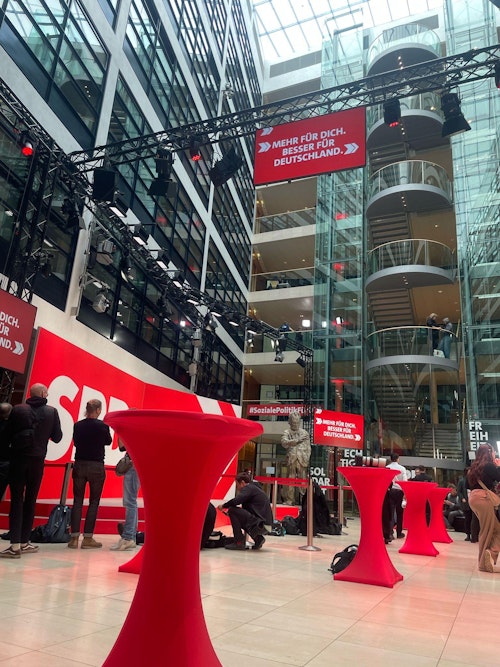
Voting in costume?
In some parts of Germany, Carnival is also being celebrated today. For those who want to vote first and then go to a parade, the rule is: you should be recognisable despite the costume because voters will need to show their ID card when voting, newspaper Die Zeit writes.
In addition, costumes with political messages are not allowed — these are prohibited in polling stations under German Federal Election Law.
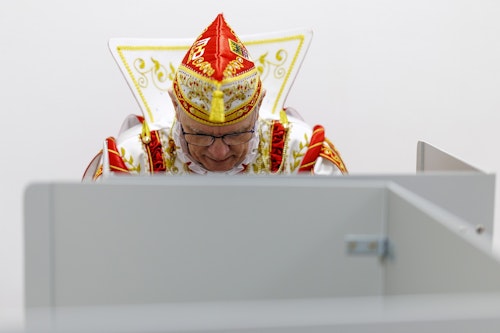
Post-election: AfD could join Patriots in Brussels
The AfD party could join the Patriots for Europe group in the European Parliament after the election, Euronews' Vincenzo Genovese and Maia de la Baume reported last week.
Sources confirmed that the idea is making the rounds within the group but that there is currently no schedule for talks.
After the EU election last June, AfD formed a new group in the Parliament: Europe of Sovereign Nations (ESN), which currently has only 26 lawmakers from eight countries, making it the smallest group in the Chamber.
However, Patriots for Europe is now the third-largest group in the Parliament, with 86 MEPs from 13 EU Member States, including some from France’s Rassemblement National, Italy’s Lega, and Hungary’s Fidesz. One of its main figures, Hungarian Prime Minister Viktor Orbán, endorsed the party when he met AfD’s co-leader Alice Weidel in Budapest last week.
Read more here on what the election result can mean for the party in Brussels:
Far-right AfD could join Patriots for Europe after German elections
“It will be interesting to see its electoral score next Sunday,” said an MEP from France’s Rassemblement National. #EuropeNews
Turnout higher in more states
Updated figures reported by German media outlet Der Spiegel suggest that turnout is higher in more states when compared to the last federal election in 2021.
Berlin's turnout is at 33% at noon, compared to 25.4% last time around. In Saxony it's 27%, compared to 25.9% in 2021.
Numbers also went up in Lower Saxony, where already 42.9% of the electorate voted by noon, and in Thuringia where some 44.5% voted.
Speaking about postal vote issues...
... the German ambassador to the United Kingdom is one of the people who did not manage to vote because he did not receive the documents.
Miguel Berger posted on X that the "deadlines were too tight" and "procedures too bureaucratic."
Keine #Wahlunterlagen bei mir in London angekommen!
— Miguel Berger (@GermanAmbUK) February 22, 2025
Bei der #Bundestagswahl können viele Deutsche im Ausland ihr Wahlrecht nicht ausüben. Fristen wurden zu knapp kalkuliert, die Verfahren sind zu bürokratisch. Eine Reform ist dringend notwendig. @Wahlleitung_de
Postal vote issues
Despite some of the party leaders voting early or by mail, Germans living abroad are calling for sweeping electoral reforms after postal delays have prevented some of them from voting in today's critical federal election.
Under the current rules, the German diaspora cannot vote at their local embassies or consulates, nor can they ask a proxy to cast a ballot on their behalf back home.
Instead, they have to rely on the often unreliable international postal system. More by Rory Sullivan here:
German expats slam electoral rules after postal delays hinder voting
Issues with mail-in voting have stopped members of the German diaspora from casting a ballot in Sunday’s crucial federal election.
What TikTok, Meta, Snap and Google are doing to counter fake news
German authorities have warned in recent weeks that a disinformation campaign originating from Moscow could be trying to influence the outcome of the election campaign, as allegedly happened in the November Presidential election in Romania.
The European Commission last month asked Microsoft, TikTok, LinkedIn, Google, Snap, Meta and X to take part in a stress test, to make sure they have appropriate risk mitigation measures in place.
Here is what online platforms say they are doing to protect the German election from disinformation.
How are web platforms protecting the German electorate from fake news?
Just two weeks until the federal election in Germany, platforms said they have measures in place to counter disinformation.
AfD co-chair confident about good result
Tino Chrupalla, the co-chair of the right-wing AfD party, said he is confident that his party will achieve "a very strong result with over 20% [of the votes]", Tagesschau reports.
Especially in the east of Germany, the AfD will win a lot of direct mandates. "I think this is a clear political statement by the citizens and the voters,” he said while voting in Gablenz, Saxony.
The other co-chair of the AfD, Alice Weidel, has opted for postal voting.
Germany’s voting system explained
The German voting system is notoriously complex, making it difficult for many to digest the results as they roll in on election night. This year, a newly reformed electoral law designed to shrink a bloated Bundestag will also kick in for the first time, bringing small but potentially crucial changes to how parliament seats are distributed.
Read more in this explainer from Mared Gwyn Jones here:
How does Germany’s electoral system work and what changes this year?
Sunday’s crunch vote is a first test for a recently reformed electoral law. #EuropeNews
Hamburg voter turnout lower than four years ago, higher in Bremen and Saxony-Anhalt
Slightly fewer people have cast their votes on Sunday morning in Hamburg compared to four years ago, according to German newspaper Die Welt. At 11am, the voter turnout was 45%. In the 2021 election, 49.8% of eligible voters had voted at that time.
At the same time, the turnout in Saxony-Anhalt and Bremen was some 5% higher this morning, than four years ago.
The overall turnout in 2021 was just above 76%.
Inside a Berlin polling station
Euronews' Mathias Huber is on the ground in Berlin and spoke to some voters at a local polling station. Here is what they told him:
Simon is going out to vote today. He thinks the election campaign is addressing the wrong issues and would like to see more focus on climate change. He doesn't think migration is as important. “I don't think we have a big problem with migration in this country”, he says. Overall, he's not happy with the discussions during the election cycle.
An elderly couple has just come back from the polling station. Above all, they want peace and don't want any arms delivered to other countries. During the election campaign, they felt that media coverage in Germany was imbalanced. In their opinion, parties such as BSW and AfD were being framed unfairly. The party representatives should be “allowed to speak more freely”, they say. They now use more alternative media from other countries, such as Austria, where they feel coverage is more balanced.
Annika is just on her way to the polling station with her child. She would like to see more emphasis placed on the topic of education. She didn't like the election campaign overall. “Not great,” she says.
Johannes and his flatmate Max voted by post. The most important issue for Johannes was foreign policy. He added that candidates' honesty played a big role in his decision. Max, on the other hand, wants more effective measures to address the effects of inflation on society and boost the economy. “Social justice and economic success should go hand in hand”, he explains.
The effect of Musk's ongoing AfD support
Tech billionaire Elon Musk, owner of social media platform X, SpaceX and Tesla, caused a stir in the German political establishment shortly before Christmas when he claimed “only the AfD can save Germany” — right at the start of a tense election campaign.
Despite rebukes from German politicians, Musk published an op-ed supporting the party in the country’s Welt am Sontag newspaper, and hosted a live discussion on X with the far-right AfD’s candidate for chancellor, Alice Weidel.
Read more on his efforts and whether he could actually have an impact on the electorate, by Euronews' Tamsin Paternoster and Liv Stroud.
The Musk effect: Could the X owner actually impact Germany’s election?
The tech billionaire’s comments online have caused Germany’s government to claim he was ‘interfering’ in the country’s upcoming elections – but it’s unclear ye…
Greens leader Habeck voted weeks ago
We will not see Robert Habeck, the Chancellor candidate of the Greens, in a polling station today: he already voted weeks ago. Germans who are unable to vote on election day could use postal voting or show up in one of the electoral offices in their constituencies.
"No time" of "I forgot" doesn't count, Habeck said.
What a day, denn: Ich habe gewählt! Das geht? Ja klar! In vielen Regionen und Kommunen kann man schon vor dem 23. Februar von seinem Wahlrecht Gebrauch machen. Wenn Sie also am Wahltag verhindert sind, nutzt auf jeden Fall entweder Briefwahl oder macht es wie ich und geht direkt… pic.twitter.com/vfenhAh5d2
— Robert Habeck (@roberthabeck) February 7, 2025
It's the economy
The economy is a key topic in today's election. But Europe's biggest economy has not seen significant growth in five years. Here's five reasons why:
Here are five key reasons why Germany’s economy is struggling
Here are five key reasons why Germany’s economy is struggling as voters decide on 23 February who will run their next government.
It's Merz' turn
CDU Chancellor candidate Merz has voted in Arnsberg, in his constituency. In the 2021 election, some 40% of voters in his district voted for him.
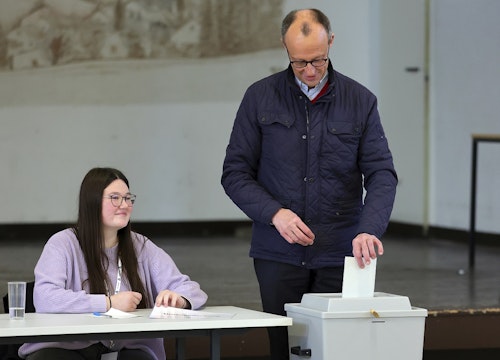
Heute ist ein entscheidender Tag für unser Land. Ich habe soeben in meiner Heimat im Sauerland meine Stimme abgegeben. Jetzt liegt es an Ihnen: Nutzen Sie Ihr Wahlrecht!⁰⁰Mein besonderer Dank gilt den vielen ehrenamtlichen Wahlhelferinnen und Wahlhelfern, die mit ihrem Einsatz… pic.twitter.com/jQKCt8VOjC
— Friedrich Merz (@_FriedrichMerz) February 23, 2025
Surge of The Left?
Germany's Die Linke or The Left party is experiencing a last-minute surge in numbers. The left-wing party, which polled at around 4% in January, has seen its numbers rise to 6% to 7% in recent weeks.
One survey from pollster YouGov puts the party at 9% — a significant jump from a month ago and well above the 5% threshold it would need to enter the Bundestag. More here:
German The Left party sees surge in support after going viral online
The Die Linke or The Left party has gained momentum and jumped up in the polls in the final stretch ahead of Germany’s federal elections on Sunday. #EuropeNews
Scholz: Go vote!
A last call by Chancellor Olaf Scholz on X to go vote today.
Leading by example, he just cast his vote in Potsdam.
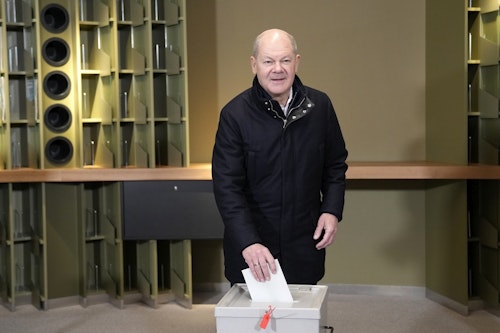
Gehen Sie wählen. Für einen höheren Mindestlohn, für Steuererleichterungen für die breite Mehrheit, für stabile Renten und Investitionen in gute Arbeitsplätze und unsere Sicherheit. Für eine stabile Regierung und den gesellschaftlichen Zusammenhalt in unserem Land. Mein Rat:… pic.twitter.com/dTnTPpUscL
— Olaf Scholz (@OlafScholz) February 23, 2025
What about climate change?
Climate change has dropped down the list of voter priorities, and politicians have steered clear of talking about the issue, believing it won’t win them the election.
The latest polling from election analysts Forschungsgruppe Wahlen saw respondents name peace and security (45%) and the economy (44%) as the most important issues for their own voting decision.
However, climate change is a divisive topic in German politics. Euronews’ energy reporter Rosie Frost has this overview on where the parties stand on climate issues:
Why climate change has taken a back seat in the German election
After becoming a deciding issue for many in 2021, climate change has now dropped down the list of voter priorities in Germany.
Protests in run up to the vote
In the run up to the election, Germany saw a range of protests in different cities against cooperation between the CDU and AfD.
Many protesters focused on CDU’s Merz – who proposed two anti-immigration bills to the German parliament. He broke a long-standing pledge to not cooperate with the far-right AfD, when he accepted its votes in order to pass his migration proposal.
If CDU indeed becomes the biggest party, it is expected to form a two-party coalition with either the center-left SPD or the Greens.
Tens of thousands protest against far-right in Germany
Tens of thousands of people took to the streets of Germany to protest against the CDU’s migration policy and its voting behaviour in the Bundestag.
Bavarian PM votes
Markus Söder, the Prime-Minister of the state of Bavaria, voted in Nuremberg this morning. Söder is also the leader of the Christian Social Union (CSU), a sister party of the CDU.
The CDU operates in fifteen German states, whereas CSU only operates in Bavaria. The two parties also share are a parliamentary group in the German parliament: CDU/CSU.
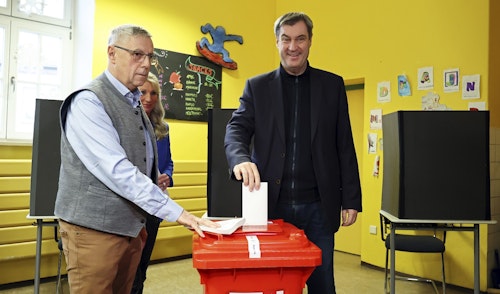
Eyes on the small parties
The CDU and it’s leader Friedrich Merz has long been described as the front runner in this election, polling in first place with around 30% of the vote according to estimates.
But that doesn’t mean Merz can rest easy today, and he will likely be following the results of small parties as closely as his own.
That’s because due to Germany’s political system his chances of building a two party coalition decrease dramatically the more smaller parties cross the 5% threshold and enter the Bundestag.
Merz is hoping to build a coalition with Olaf Scholz’s Social Democrats (SPD) or, at a push, the Greens.
If the Die Linke enter the Bundestag, which looks likely given they have recently seen an upswing in the polls with 9%, his chances of building a two-party coalition with a majority decrease.
If the pro-business Free Democratic Party (FDP) or the left- conservative Sahra Wagenknecht Alliance both enter parliament, a two- party coalition would be near impossible.
German election Q&A: What’s at stake for smaller parties?
For three German parties, their existence and participation in the Bundestag is riding on Sunday’s elections. Euronews spoke with Die Linke, Sahra Wagenknecht…
Grey election morning
The streets of Berlin are quite empty, the few people out and about are either going to vote or to buy some breakfast, Euronews' Berlin Bureau Chief Lena Roche writes in.
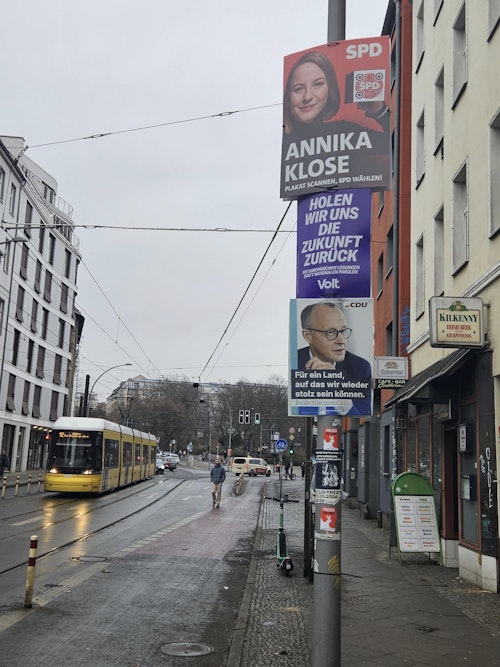
Scholz vs Merz: final debate
Chancellor Scholz and CDU's Merz faced off in a final debate on TV last Wednesday, while they discussed migration, the economy, and security issues.
Merz emphasised what is most important to him and his party: migration and economic turnaround. He said these problems must be solved at all costs, or Germany will slide into right-wing populism in a few years.
In terms of the economy, Scholz promises to invest in infrastructure and create a "Made in Germany bonus" to boost investment. Merz, on the other hand, wants to reduce energy prices first, with the help of lower network charges and energy taxes.
More on their last confrontation here:
Scholz and Merz face off in final debate ahead of German election
During the debate the candidates touched on migration, the economy, and security. #EuropeNews
Presidential vote
Germany's President, Frank-Walter Steinmeier, has voted in a polling station in Berlin. Steinmeier, who has held the role since 2017, is a member of the center-left SPD party.
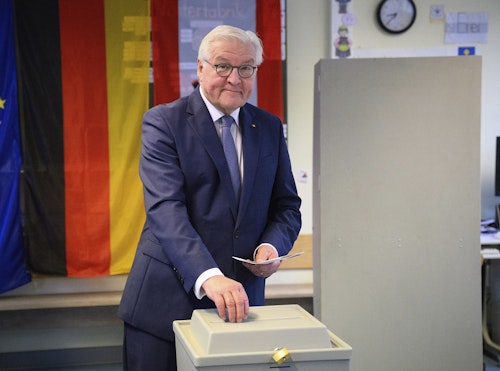
Who is Friedrich Merz?
The 69-year-old CDU leader Friedrich Merz is a major favourite for German chancellorship. He has been consistently ahead in the polls ever since the incumbent Chancellor Olaf Scholz lost a confidence vote in December last year, resulting in an early election.
Looking to steer the party in a more conservative direction, he has made curbing irregular migration a central issue in its politics. In January he pushed through a non-binding motion that advocated for stricter immigration rules, such as border controls and increased deportations, despite criticism that this could break both German and EU asylum law.
Read more, also on his power struggle with Angela Merkel, below:
Who is Friedrich Merz, the favourite to become Germany’s chancellor?
The 69-year-old CDU leader Friedrich Merz is a major favourite for the German chancellorship after Sunday’s snap election. #EuropeNews
Latest polls: CDU ahead of AfD
The latest polls before the vote suggest that the center-right Christian Democratic Union (CDU) is still on course for victory.
The CDU and Chancellor candidate Friedrich Merz are expected to get some 30% of the vote, followed by the right-wing Alternative for Germany (AfD) with around 20%.
The center-left SPD and the Greens are at 16% and 13% respectively.
The Left Party (Die Linke) could enter parliament with up to 8 percent. The FDP (4 to 5%) and the Sahra Wagenknecht alliance (3 to 5%) seem unlikely to meet the threshold.
Good morning and welcome to this election live blog
Today some 59.2 million Germans are eligible to vote in federal elections - of which 2.3 million people are first-time-voters.
Polling stations opened at 8am and will be open until 6pm throughout the country, when we expect the first exit polls.
We will take you through the day with this liveblog, correspondents on the ground, and a live TV show when the results come in.
A quick re-cap, these are the top candidates running for Chancellor, and their policy priorities.
German election: Here are the top candidates and their main policies
Germany’s conservative parties and far-right AfD lead in the polls, with the CDU’s Friedrich Merz likely to become chancellor after the 23 February vote. #Euro…












